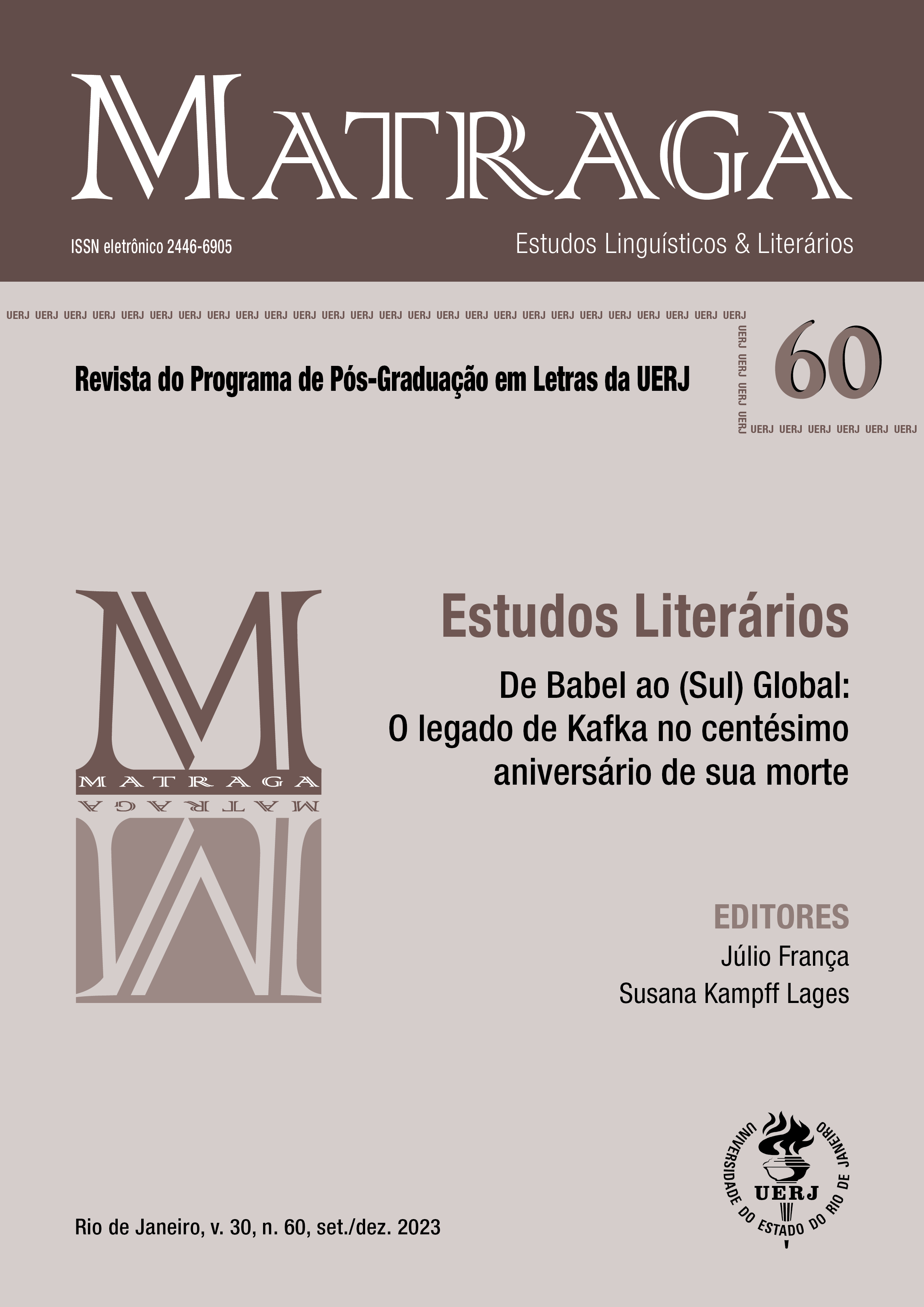Kafka, Simmel and the composition lines of a map: Resonances from A Hunger Artist (1922)
DOI:
https://doi.org/10.12957/matraga.2023.74787Keywords:
Franz Kafka, Literature and Sociology, Georg Simmel, Individual, FictionAbstract
The work proposes a reflection on the possibilities of dialogue between theoretical and fictional narratives, specifically the work A Hunger Artist, by Franz Kafka (1883-1924) and Georg Simmel’s critique of culture. Through bibliographical review, I try to analyze versions of the contrast between the individual and society through the transversalities between the fictional and the theoretical, identifying points of dialogue between literature and sociology. The aim of this work is to verify the theoretical and literary performance of century-old classic texts, in order to form a discussion axis regarding the critical thinking of culture. Considering how to determine the potency of the short story A Hunger Artist, the research is part of the investigation effort regarding the book of Kafka’s work to think about sociological theories, in order to seek the traces of a Kafkian map through which sociological perspectives can be updated.
Downloads
References
ADORNO, Theodor. Prismas: Crítica cultural e sociedade. Tradução por Augustin Wernet e Jorge Mattos Brito de Almeida. São Paulo: Ática, 1998.
ARON, Raymond. As etapas do pensamento sociológico. Tradução por Sérgio Bath. São Paulo: Martins Fontes, 2000.
BAUMAN, Zygmunt. Modernidade e ambivalência. Tradução por Marcus Penchel. Rio de Janeiro, Jorge Zahar, 1999.
CAMUS, Albert. O mito de Sísifo. Tradução e apresentação por Mauro Gama. Rio de Janeiro: Guanabara, 1989.
CARONE, Modesto. O Fausto do século 20. Folha de São Paulo. São Paulo, 22 out. 2000. Caderno Mais! Dis¬ponível em: <http://www1.folha.uol.com.br/fsp/mais/fs2210200003.htm>. Acesso em: 25 mar. 2023.
CARONE, M. O Realismo em Franz Kafka. Novos Estudos Cebrap. n. 80, março de 2008, p. 197-203.
COLLINS, Randall. Quatro tradições sociológicas. Tradução por Raquel Weiss. Petrópolis: Vozes, 2009.
COSTA LIMA, Luiz. Limites da Voz: Montaigne, Schlegel, Kafka. Rio de Janeiro: Topbooks, 2005.
ECO, Umberto. Obra aberta: forma e indeterminação nas poéticas contemporâneas. Tradução por Giovanni Cutolo. São Paulo: Perspectiva, 2010.
DELEUZE, Gilles; GUATTARI, Félix. Kafka: por uma literatura menor. Tradução por Cíntia Vieira da Silva. Revisão da tradução por Luiz B. L. Orlandi. Belo Horizonte: Autêntica, 2014.
DELEUZE, Gilles; GUATTARI, Félix. Mil Platôs: capitalismo e esquizofrenia. vol. 3. Rio de Janeiro: Ed. 34, 1996.
FRISBY, David. Sociological Impressionism: a reassessment of Georg Simmel’s theory. New York: Routledge, 1992.
FRISBY, David. Fragments of Modernity. Theories of Modernity in the Work of Simmel, Kracauer, and Ben¬jamin. (Studies in Contemporary German Social Thought), 1986.
HABERMAS, Jürgen. Epílogo: Simmel como intérprete de la época. In: SIMMEL, Georg. Sobre la aventura: Ensayos filosóficos. Tradução por Gustau Muñoz y Salvador. Barcelona: Península, 1998.
ISER, Wolfgang. O ato da leitura: uma teoria do efeito estético. Tradução por Johannes Kretschmer. São Paulo: Ed. 34, 1996.
KAFKA, Franz. Um Artista da Fome. In: KAFKA, Franz. Essencial. Tradução por Modesto Carone. São Pau¬lo: Penguin Classics/Cia das Letras, 2011. p. 43-58.
KANT, Immanuel. Fundamentação da metafísica dos costumes. Tradução por Paulo Quintela. Lisboa: Edi¬ções 70, 2014.
LUKÁCS, Georg. Realismo crítico hoje. Brasília: Coordenada, 1969.
LUKÁCS, Georg. Pósfácio à memória de G. Simmel. In: SIMMEL, George. Filosofia do amor. Tradução por Eduardo Brandão. São Paulo: Martins Fontes, 2006.
MORAES FILHO, Evaristo de (org.). Simmel – Coleção Grandes Cientistas Sociais. Vários tradutores. São Paulo: Ática, 1983.
RICOEUR, Paul. Tempo e Narrativa 1: a intriga e a narrativa histórica. Tradução por Claudia Berliner. São Paulo: Martins Fontes, 2012.
SCHOLLHAMMER, Karl Erik. As práticas de uma língua menor: reflexões sobre um tema de Deleuze e Guat¬tari. Ipotesi, vol. 5, n. 2, jul/dez 2001, Juiz de Fora, Ed. UFJF, p. 59-70.
SCHOPENHAUER, Arthur. O mundo como vontade e representação. Tradução por Jair Barboza. São Paulo: EdUnesp, 2005.
SIMMEL, Georg. Nietzsche & Schopenhauer. Tradução por César Benjamin. Rio de Janeiro: Contraponto, 2011.
SIMMEL, Georg. Sobre la Aventura: Ensayos Filosóficos. Barcelona: enínsula, 1988.
SIMMEL, Georg. Questões Fundamentais de Sociologia. Tradução por Pedro Caldas. Rio de Janeiro: Jorge Zahar, 2006.
SIMMEL, Georg. A metrópole e a vida Mental. Tradução por Sérgio Marques dos Reis. In: VELHO, Otávio Guilherme (org.). O fenômeno urbano. Rio de Janeiro: Zahar, 1967.
SIMMEL, Georg. A ponte e a porta. In: Política e Trabalho. n. 12. Tradução por Susana Maldonado. João Pessoa: UFPB, set. 1996.
SIMMEL, Georg. A asa do vaso. In: SOUZA, Jessé; ÖELZE, Berthold (orgs.). Simmel e a modernidade. Bra¬sília: UnB, 2005b. p. 127
SIMMEL, Georg. Problemas Fundamentales de la Filosofía. Sevilha: Espuela de Plata, 2006.
SIMMEL, Georg. Simmel: Cultura filosófica. Tradução por Lênin Bicudo Bárbara. São Paulo: Editora 34, 2017.
SINGER, Ben. Modernidade, hiperestímulo e o início do sensacionalismo popular. In: CARNEY, Leo; SCHWARTZ, Vanessa. O cinema e a invenção da vida moderna. Tradução por Regina Thompson. São Paulo: Cosac Naify, 2004.
SOUZA, Jessé; ÖELZE, Berthold (orgs.). Simmel e a modernidade. 2. ed. Brasília: EdUnb, 2005.
VILLAS BÔAS, Glaucia. A recepção da sociologia alemã no brasil. Rio de Janeiro: Topbooks, 2006.
Downloads
Published
How to Cite
Issue
Section
License

This work is licensed under a Creative Commons Attribution-NonCommercial 4.0 International License.
Authorization
Matraga – Scientific Journal of the Post-graduate Program in Arts and Humanities of UERJ is authorized to publish the article submitted here, if it is accepted for online publication. It is attested that the contribution is original, that it is not being submitted to another publisher for publication, and that this statement is the expression of truth.
The works published in Matraga's virtual space – Scientific Journal of the Post-graduate Program in Arts and Humanities of UERJ will be automatically transferred, and your copyright is reserved to Matraga. Its reproduction, in whole or in part, is conditional on the citation of the authors and the data of the publication.

Matraga uses license Creative Commons - Attribution-Non-Commercial 4.0 International.





